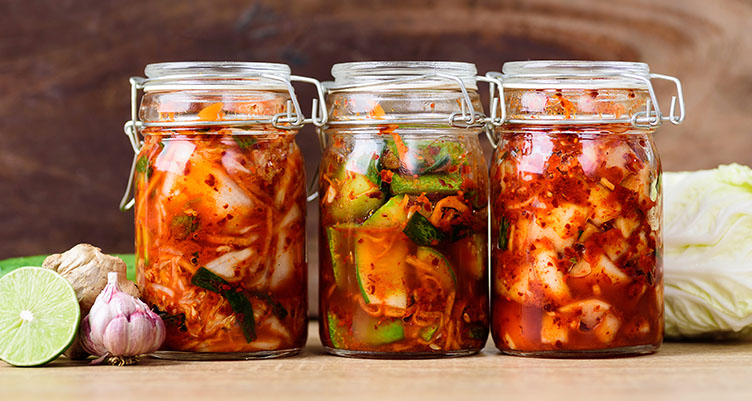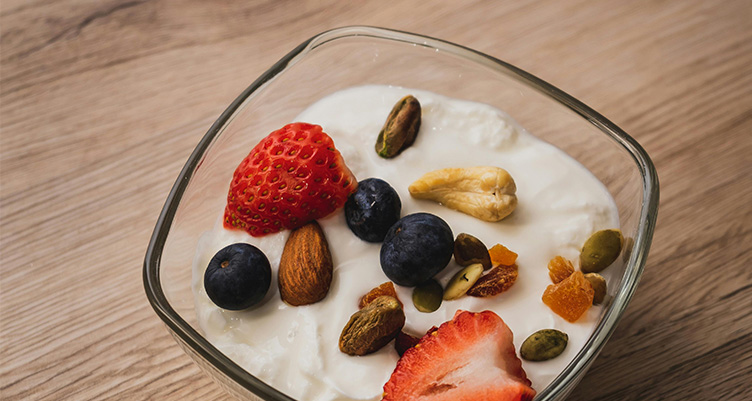Fermented Foods for Gut Health: Top Picks to Improve Your Digestion

- Fermentation is a process that uses bacteria to break down carbs into alcohol or acid. This results in a tart, acidic flavor.
- Fermented foods preserve the shelf life of food and contain probiotics. Probotics are the “good” bacteria that improve gut health and support the immune system.
- Learn about the best fermented foods for gut health. This includes sauerkraut, kimchi, miso, kombucha and yogurt.
Fermented foods like sauerkraut may be acidic and sour, but the benefits are pretty sweet. They promote the growth of probiotics—the “good” bacteria that help foster a healthy gut. Probiotics keep bad bacteria in check and promote a diverse microbiome system. This may help prevent irritable bowel syndrome, occasional constipation and diarrhea.[1]
Some of the best fermented foods for gut health include sauerkraut, kimchi, kombucha and yogurt. Read on to learn about the ultimate fermented foods list for gut health.

What Are Fermented Foods?
Fermentation is a process that occurs when yeast and natural or added bacteria break down starches or sugars. This process of breaking down carbohydrates results in compounds such as alcohol or acids.
These compounds are natural preservatives that increase the shelf life of foods and improve taste and texture.[2] Fermentation also helps the body better absorb nutrients from foods.
Benefits of Fermented Foods for Gut Health
Fermented foods largely contain probiotics. The most common strains are Lactobacillus and Bifidobacterium.[3] Probiotics help balance the number of “bad” bacteria in the gut, such as Escherichia (E. coli), salmonella and staphylococcus.
Since the gut plays a role in overall wellness, probiotics have also been found to support the immune system and prevent various diseases.

Fermented Foods List
If you’re wondering if all fermented foods contain probiotics, the answer is no. Some foods are fermented using vinegar and not live organisms that contain probiotics.[4]
Your safest bet is to choose foods that have “naturally fermented” on the label. You also want to see bubbles in the liquid when you open the jar.
Here are the foods that pass the fermented test for containing probiotics. We’ve also included some of the best gut health recipes.
Sauerkraut
Some people may not be able to stomach sauerkraut, which means “sour cabbage” in German. But the benefits are easy to digest. Sauerkraut is high in fiber and probiotics.
According to the USDA, one serving of sauerkraut contains 2 grams of fiber.[5] And research has found that there are over 200 strains of good bacteria in a batch of sauerkraut.[6] Use it as a topping for hot dogs or sandwiches or add it to soups and stews.
Kimchi
Kimchi is a traditional Korean dish. It’s made from salted, fermented vegetables, such as cabbage, radishes, carrots and scallions. Gut-friendly probiotics are inside every red-tinged jar. These probiotics may support the immune system, soothe the gut and prevent IBS.[7]
Kimchi is usually in the refrigerator section at grocery stores. Or you can make a foolproof kimchi recipe at home.
Kefir
Kefir (pronounced Ke-FEER) is a fermented milk drink that delivers nutrition with every sip. It’s made by adding kefir grains (also called starter grains) to any kind of milk, such as full-fat animal milk or dairy-free milk. Kefir has three times more probiotics than its dairy cousin, yogurt. So go ahead and pour it over cereal, add it to smoothies or drink it like a drinkable yogurt.
Kombucha
You can’t wander far in a grocery store without seeing kombucha. The flavors in each bottle may be different, but the brew is typically the same: tea, bacteria, yeast and sugar.[8]
If you’re looking to cut back on caffeine or sugary sodas, kombucha is a good alternative. Be aware that it contains a tiny amount of alcohol—often no more than 0.5 percent. Some brands of kombucha contain more sugar than others. Since both sugar and alcohol are considered some of the worst foods for your gut health, always read the labels.
Miso
Miso is a fermented soybean paste that’s made by combining soybeans, barley or brown rice with salt and koji (a type of fungus). Miso adds an umami flavor to many dishes, such as soups, marinades and salad dressings. As a rich source of probiotic bacteria, miso has been linked to several benefits, such as supporting gut health and immune function.
One 2018 cross-sectional study found that people who eat miso soup regularly are less likely to experience symptoms of gastroesophageal reflux disease. These include nausea, bloating and regurgitation.[9] If you’re on a low-histamine diet, bear in mind that soy products can potentially trigger a histamine release in the body.[10]
Tempeh
Like tofu, tempeh is a plant-based meat alternative made from soy. This firm, nutty-flavored food is prepared by combining soybeans with a mold called Rhizopus, also known as a temper starter.[11]
Tempeh is a complete source of protein that contains all nine essential amino acids. It’s popular among vegetarian and vegan communities. It’s also buzzworthy because of its high content of fiber, vitamin E and polyunsaturated fats.[12]
Yogurt
Yogurt is a staple in many households. It’s also one of the best sources of probiotics. Unlike some fermented food, some good bacteria from yogurt survive the journey through the gastrointestinal tract. By reaching the intestines, this has the greatest impact on gut health.[13] Yogurt is also a good source of B vitamins, vitamin A, calcium and potassium. For yogurt with the best probiotic potential, look for the “Live & Active Cultures” seal on the container.
Eating a diet rich in fermented food can support peace and harmony in your gut. The fermentation process promotes the growth of probiotics, which supports gut health. Some of the best fermented foods for gut health include sauerkraut, kimchi, kombucha and yogurt. When it comes to dairy, try to choose grass-fed and organic whenever possible. And always read the labels to ensure your fermented foods contain live, active cultures.
Sign up for early access to sales, product launches, the latest Bulletproof news and more!



